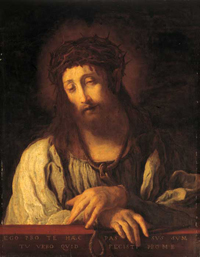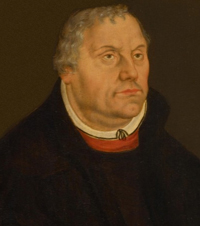“The righteous shall live by faith.” It represents the ultimate summary of the Reformation, as well as a synthesis of the Bible.
 Photo: Zachary Young (Flickr, CC)
Photo: Zachary Young (Flickr, CC)
«The righteous shall live by faith»: one phrase, six words. Today we would call this a «tweet».
It represents the ultimate summary of the Reformation, as well as a synthesis of the Bible. We can find this text four times in the Bible -Habakkuk 2:4, Romans 1:17, Galatians 3:11, Hebrews 10:39- which hints at the importance of the principle we are covering: faith is essential for life.
This verse was the spiritual and theological driving force behind the Reformation. In 1519, while preparing a sermon on Paul's Epistle to the Romans, Martin Luther had an experience, known as the «Experience of the tower». Luther wrote:
«At last meditating day and night -on this verse, “The righteous shall live by faith”-, by the mercy of God, I began to understand that the righteousness of God is that through which the righteous live by a gift of God, namely by faith. Here I felt as if I were entirely born again and had entered paradise itself through the gates that had been flung open. There a totally other face of the Scripture showed itself to me».
This statement represents, at once, a great synopsis of the Gospel and the biblical seed which gave rise to the great awakening of the Reformation, with all its spiritual and social consequences. It is not an exaggeration, therefore, to say that we are facing the most important short message -tweet- in life.
To fully understand this message, we are going to compare it to a tree: it has a trunk -by faith- which is the heart of the matter, and two main branches, vital consequences: the righteous and shall live. We will pay special attention to the trunk and then, more briefly, to these two branches.
BY FAITH
This is the heart of the matter, the trunk of this tree. What is faith?
Christian faith is not a question of believing in something, but in somebody. The key question is not what do we believe, but whom do we believe. Paul the Apostle said: «I know whom I have believed» (2 Timothy 1:12 ESV). The object, the recipient of this faith, is a living being, the personal God revealed in the Bible and incarnated in Jesus Christ, not an abstract, impersonal force. Believing is much more than just holding a belief.
What does this faith mean in practical terms? Faith entails three steps. These are precisely the steps found in every love relationship, which correspond broadly with Martin Luther's spiritual experience and the conclusions that became the foundations of the Reformation: Sola fide (by faith alone), Sola Scriptura (by Scripture alone), Sola Gratia (by faith alone).
- Faith means knowing.
- Faith means trusting.
- Faith means committing.
These three progressive steps, which are characteristic of love relationships, can also be found in the Christian faith:
Faith means KNOWING God through his Word
Christians are given the unique privilege of not only believing in God, but of knowing Him. There is an essential component of personal, life experience. This is because faith is not just an ideology -we are not merely cultural Christians- or a religion -dogma and rites- but is above all a relationship: a personal relationship with Christ. To the believer, God is neither «it», nor «he»; God is a close «you». This is described wonderfully in the first sentence of the Lord's Prayer: «Our Father in heaven, hallowed be your name» (Matthew 6:9). Jesus summarized this idea in a crucial statement: «And this eternal life, that they know you the only true God» (John 17:3 ESV).
How can we get to know God? We know God, at first, through his verbal revelation, the written word. Every Christian's spiritual experience starts from faith in Scripture (Sola Scriptura), the deeply held conviction that the Bible is the word of God. This was Martin Luther's first step: he applied himself to reading and rereading the Bible, especially the Epistle to the Romans.
Faith means DISCOVERING the grace of God in Christ
Knowledge is followed by trust. Faith in the Word leads to faith in grace (Sola Gratia). Every love relationship involves trust. This was Martin Luther's second step in his experience -we will elaborate on this in due course. God's revelation, started with spoken words, reaches its full splendor in Christ, the Word par excellence. Christ is «the image of the invisible God» (Colossians 1:15). Discovering and appropriating the grace of God in my life involves trusting that Christ not only died, but died for me. The grace of Christ in the cross is the core and the climax of the faith. «Fixing our eyes on Jesus, the pioneer and perfecter of faith… Consider -discover- him who endured such opposition from sinners» (Hebrews 12:2-3 NIV).
Faith means ANSWERING to God's love in Christ with my love
Trust leads to commitment, the third necessary component in a love relationship. The cross of Christ allows me to understand that God has already taken the first step and that now it is my turn to give an answer. In this respect Christianity is the opposite of religion: religions go from bottom to top, describing the toils of human beings to reach God. Christian faith is the exact opposite: it goes from the top to the bottom, describing God's toils to reach out to men.
 Domenico Fetti's Ecce Homo. / Wikimedia
Domenico Fetti's Ecce Homo. / WikimediaA historical example of this commitment which stems from an answer to God's love is found in Count Nikolaus Ludwig von Zinzendorf -18th century- who was deeply moved by Domenico Fetti’s painting of Christ crucified, with an inscription in Latin at the bottom of the canvas saying: «This have I suffered for you; now what will you do for me?». As an answer to this question, Zinzendorf's life changed, and he founded the community of the Moravian Brethren, a movement of spiritual awakening which had a great influence at the time.
THE RIGHTEOUS
The first consequence of faith is that it makes us righteous before God. This is the first branch of our tree.
Paul the Apostle puts it in very positive terms: «Therefore, since we have been declared righteous by faith, we have peace with God through our Lord Jesus Christ» (Romans 5:1 HCSB). Faith produces an indispensable moral cleanness, being indispensable since «There is no one righteous, not even one» (Romans 3:10 NIV), we are all sinners. This is one of the central tenets of the Reformation: grace cleanses us of Sin by means of transference. Martin Luther calls it «the sweet and wonderful exchange»: by believing, sin is transferred to -is put upon- Christ, and Christ's righteousness is transferred to the sinner. By faith, the sinner is declared righteous, even if not perfect yet (simul justus et peccator).
Furthermore, justification before God allows us to live righteously before men. The moral and personal component is followed by the social and community dimension of faith. The order of the factors here is important: true righteousness starts with justification before God. Christian ethics stem from faith, they are not mere humanism, seeking to build men starting from men. Justice among men is only possible starting from justification before God.
SHALL LIVE
The second consequence of faith is life. Faith produces life. In the second branch we find the promise of life, a word of hope. How important it is to have hope in a world that fumbles around in the dark!
Faith is essential for life, here and now, but also for the great beyond, in the afterlife. Let us see in greater detail how fruitful this branch is.
Life here and now: a full life
In one of his most memorable quotes, Jesus said: «I have come that they may have life, and have it to the full» (John 10:10 NIV). The word full, or abundant means superior, optimal, a life of quality, in the original Greek text.
Three examples illustrate how Jesus gives full, abundant life:
- Faith in Christ illuminates.
«I am the light of the world. Whoever follows me will not walk in darkness...» (John 8:12 ESV).
His light gives a deep meaning to life and to people -an identity. It replaces the despairing cry «Vanity of vanities! All is vanity» (Ecclesiastes 1:2 NASB) with an exultant «Fullness of fullnesses! All is fullness», in Unamuno's suitable words.
- Faith in Christ transforms.
«Therefore, if anyone is in Christ, he is a new creation. The old has passed away; behold, the new has come» (2 Corinthians 5:17 ESV).
His power has changed, and keeps changing, the lives of millions of men and women. As the well-known U2 singer Bono said, «I can't understand how an ordinary man, or a sick man, could have transformed the lives of so many people».
- Faith in Christ restores.
«My grace is sufficient for you, for my power is made perfect -complete- in weakness» (2 Corinthians 12:9).
His grace empowers and restores the weakest, the poor in the broadest sense. Jesus has rescued from the pit of existential misery millions of deprived people, because He will not «...break a bruised reed, and He will not put out a smoldering wick...» (Isaiah 42:3 HCSB).
 Martin Luther
Martin LutherFaith in Christ invigorates people, but also transforms society. The best example is something we celebrated recently: the Protestant Reformation. Above all, thanks to the spreading of the Bible -the sharp sword that destroyed medieval obscurantism- which had a great impact on the societies of those times and of the next centuries. Due to the Reformation all the spheres of life, including the economy and politics, received a boost of a living, renewed faith. Historical evidence for this can be found in musicians like Bach, Mendelssohn and Händel, painters like Dürer and Rembrandt, and a long list of scientists, philosophers and politicians who were able to experience the full life that faith provides.
The afterlife: eternal life
Life arising from faith does not end here, but keeps going on after physical death. In fact, it is then that it reaches its zenith, its maximum splendor. Jesus said: «Anyone who hears My word and believes Him who sent Me -God- has eternal life and will not come under judgment but has passed from death to life» (John 5:24 HCSB). These are transcendental words, the promise of eternal life. My eternal destiny after death depends on this tweet: faith is essential to life here, but even more so to the afterlife. Hence, the title of this article: The most important tweet in your life. This is why we need to pay attention to it and meditate on it.
I do not want to end with my own words, but with Jesus' own words, which are a warm metaphor, an invitation to have dinner together:
«Behold, I stand at the door and knock. If anyone hears my voice and opens the door, I will come in to him and eat with him, and he with me» (Revelation 3:20 ESV).
Jesus does not force the door. He is waiting for me to open it. If I do so, this love relationship will start, along with the faith that makes us righteous and gives us life forever.
Dr. Pablo Martínez has been working as a psychiatrist since 1979. He also carries out an extensive ministry as a counselor and speaker in Spain and many other European countries. He has many ties to the world of university, serving as the chairman of IFES (GBU) in Spain for eight years.
He has also served as the chairman of the Spanish Evangelical Alliance for ten years (1999-2009), and is the current president in Spain of the “Ravi Zacharias Foundation for the Dialogue between Faith and Culture”.

Las opiniones vertidas por nuestros colaboradores se realizan a nivel personal, pudiendo coincidir o no con la postura de la dirección de Protestante Digital.
Si quieres comentar o